
Berosus is a lunar impact crater that is located in the northeast part of the Moon, less than one crater diameter northwest of Hahn. Further to the east-northeast is the large crater Gauss, and to the north-northwest lies Bernoulli. Because of its location, this crater appears foreshortened when viewed from the Earth.

Berosus is a genus of beetles in the family Hydrophilidae, the water scavenger beetles. The genus contains 273 species. It is distributed worldwide.
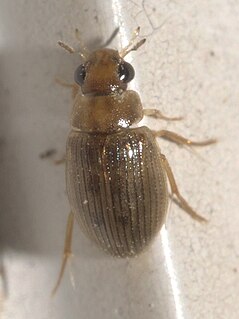
Berosus exiguus is a species of water scavenger beetles found in the United States, the Bahamas, and Cuba. These beetles are small, ranging from 2.0 to 3.5 mm in length. They can be identified by their small size, yellowish-brown head, distinctly impressed elytral striae (stripes), and often faint spots on the elytra.

Ellychnia is a genus of fireflies. First defined by Émile Blanchard in 1845, the genus contains 24 species, which are widespread in the United States. Adults are black, with rose-colored marks on the pronotum; sexual dimorphism is unknown. These beetles are active during the day, and have no light-producing organs as adults; instead, they attract mates using chemical signals. The larvae of Ellychnia fireflies live in rotting logs.
Ellychnia hatchi is a species of firefly in the genus Ellychnia.

Berosus sayi is a species of hydrophilid beetles native to the United States. It is a synonym of Berosus striatus, which was originally described by Thomas Say in 1825, and females can be characterized by a small tooth on the suture near the apex of each elytron.
Bacanius is a genus of clown beetles in the family Histeridae. There are more than 70 described species in Bacanius.

Scelolyperus is a genus of skeletonizing leaf beetles in the family Chrysomelidae. There are more than 20 described species in Scelolyperus. They are found in North America, Mexico, and the Palaearctic.

Berosus youngi is a species of water scavenger beetle found in the United States.
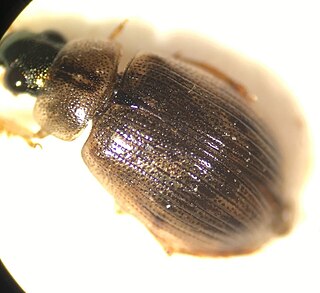
Berosus fraternus is a species of water scavenger beetle in the family Hydrophilidae. It is found in North America.
Berosus moerens is a species of water scavenger beetle in the family Hydrophilidae. It is found in Central America.
Dytiscus hatchi is a species of predaceous diving beetle in the family Dytiscidae. It is found in North America.
Berosus miles is a species of water scavenger beetle in the family Hydrophilidae. It is found in Central America and North America.

Cricotopus sylvestris formerly Cricotopus silvestris, is a species of midge in the family Chironomidae. It is found in Asia, Europe, The United Kingdom, and North America.
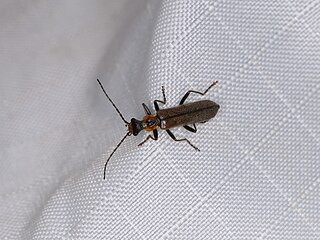
Podabrus cavicollis is a species of soldier beetle in the family Cantharidae. It is found in North America.
Bacanius hatchi is a species of clown beetle in the family Histeridae. It is found in North America.
Opiona is a genus of millipedes in the family Caseyidae. There are about 16 described species in Opiona.
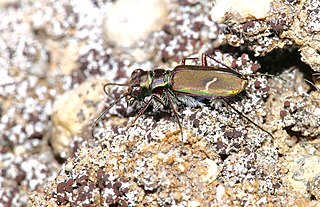
Cicindela purpurea, known generally as the purple tiger beetle or cow path tiger beetle, is a species of flashy tiger beetle in the family Carabidae. It is found in North America.

RobiHachi is a 12-episode Japanese anime television series produced by Studio Comet. The series aired from April 8 to June 24, 2019. The storyline is futurist but alludes to the story of Tōkaidōchū Hizakurige. The comically silly and purposely lame Hizakuriger robot makes its appearance, a reimagining of the long forgotten 1970s era robot anime Chōgattai Majutsu Robo Ginguiser.
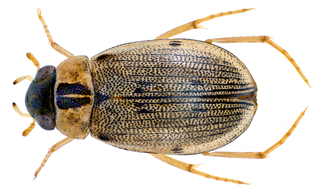
Berosus pulchellus, is a species of water scavenger beetle found in Oriental, Australasian, Afrotropical and Palaearctic regional countries such as India, Sri Lanka, Hong Kong, Japan, Iran, Cambodia and Australia.












